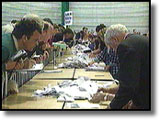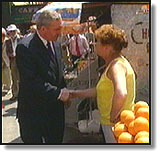
|
Poll Predictions Signal Hung Parliament in IrelandFollowing the general election in Ireland, the indications are that voters will have elected a hung parliament.Early predictions appear to confirm that opposition leader Bertie Ahern will gain seats in the new parliament, but he is not certain to become Prime Minister. His prospective partners in government, the Progressive Democrats, do not appear to be polling as well as they had hoped. So it is not yet clear whether Mr Ahern can form a stable coalition with just the PDs - he may also need the support of smaller parties or of independents. Sinn Fein has won the seat of Cavan Monaghan - the winning candidate Caoimhghin O Caolain will take up his seat - the first time this has happened since the birth of the state in the 1920's. The party is also polling much better than expected in a number of constituencies. The party was expected to be in contention for a seat in the border constituency of Cavan/Monaghan, but its candidates are also polling well in Louth, Donegal and in Foreign Minister Dick Spring's own constituency of Kerry North. Because of Ireland's complex proportional representation system of voting, the full results will not be known until Sunday June 8th. However, the Irish Times' exit poll had indicated earlier that the outgoing government has no chance of being elected. "It is not yet clear whether Fianna Fail and the Progressive Democrats will have sufficient seats to form a government. The outgoing government has no chance of being elected," the newspaper said. The opposition alliance led by Mr Ahern would appear to have 48% of the vote, while Prime Minister John Bruton and his allies have just 38%. Support for the Labour Party led by Foreign Minister, Dick Spring has apparently collapsed. It is not yet clear whether Mr Ahern can form a stable coalition with the Progressive Democrats - they may need the support of the Green Party or independents. The Fianna Fail Progressive Democrat Alliance is a centre right grouping, formed to contest the election. It has promised to trim taxes, fight crime and keep a tight lid on government spending.
Sinn Fein could take its first seat in parliament in modern Irish history and would use it to press its case for automatic entry into Northern Ireland peace talks, from which it is barred because of IRA violence. Despite an early start, with polling station open for a record 14 hours, voting proved sluggish with the turnout described as "slow" and "disappointing". Many would-be voters were thought to have been put off bad weather on election day. The election was the first in Irish history in which voters faced a choice between two coalitions. Mary Robinson, the Irish president, was one of the first to vote. She visited the polling station at a school near her official residence in Dublin's Phoenix Park within minutes of the polls opening at 8am. Political party leaders in the contest - Prime Minister John Bruton, fellow coalition ministers Dick Spring and Proinsias De Rossa and opposition chiefs Bertie Ahern and Mary Harney - also made appearances at the ballot box. Ahead of the election, both Mr Bruton and Mr Ahern insisted they would do no deals for support in the Dail from Sinn Fein in the absence of a new IRA ceasefire. |
Diana, Princess of Wales, 1961-1997
Conference 97
Devolution
The Archive
News |
Issues |
Background |
Parties |
Analysis |
TV/Radio/Web
Interactive |
Forum |
Live |
About This Site
News |
Issues |
Background |
Parties |
Analysis |
TV/Radio/Web
Interactive |
Forum |
Live |
About This Site
© BBC 1997 |
politics97@bbc.co.uk |

